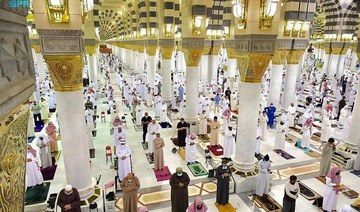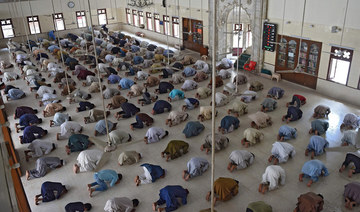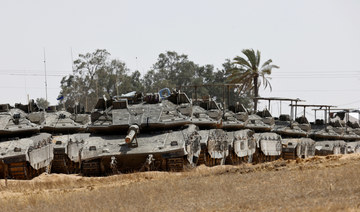LONDON: British Muslims have expressed their joy and relief at being able to worship communally in mosques after lockdown restrictions eased in time for Ramadan.
Last year, the holy month came as the UK and many parts of the world shut down amid the first wave of the coronavirus pandemic.
Muslims were forced to stay at home during Ramadan, a month usually characterized by worshipping with others and community gatherings. Many felt isolated and disconnected from their communities and routines as thousands of people died from the virus around them.
Striking images of the Grand Mosque in Makkah bereft of pilgrims and worshippers during Ramadan 2020 sent shockwaves through Muslim communities across the world.
“The most prominent image that I can think of (during the pandemic) is seeing the completely empty Grand Mosque in Makkah, an image that resonated with Muslims around the whole world,” the CEO of the Council of British Hajjis, Rashid Mogradia, said. “I never imagined that would happen during my lifetime or ever for that matter. It was quite upsetting.
“We took life and simple things like going to the mosque for granted.”
Although the pandemic is not over and the UK has lost 127,000 people to COVID-19 since it started, Ramadan 2021 is very different to last year.
Several vaccines against the virus have been developed in record time and more than ten million people have been inoculated in the UK so far, providing some protection and reassurance to society’s most vulnerable.
Lockdown restrictions in the UK eased on March 29, two weeks before the start of Ramadan. Unlike last year, communal prayer in mosques is allowed as places of worship were not required to close during the lockdown announced in January. However, strict precautionary measures have been in place to curb the spread of the virus.
Social distancing is being enforced, face masks must be worn, individual prayer mats and shoe bags used, and people are encouraged to perform ablution at home.
Only dates and bottled water are provided for iftar instead of full meals, and the length of the taraweeh prayer has been shortened.
“Ramadan 2021 is massively different to Ramadan 2020. There is an appreciation of the fact that you can enter mosques, break your fast and pray taraweeh,” Mogradia said.
“The mosques seem to look fuller than usual. That’s probably down to the fact that everyone is bringing their prayer mats and the social distancing. I am also seeing a lot more new faces at my local mosque. Those who didn’t come to the mosque as often are now attending, and that might stem from an appreciation for being able to perform prayers in the mosque. That’s really nice,” he said.
People in the UK are still not able to mix indoors with people they do not live with or who are not in their support bubble. This means that extended family iftar gatherings, a celebrated Ramadan tradition, are off the table.
However, Muslims are able to worship as a community during Ramadan 2021 and this has returned a partial sense of normality to the holy month. It has caused a surge in optimism and people feel less isolated and lonely because they are able to pray together and break their fasts, albeit briefly, with each other in the mosque.
“This time last year we were all on lockdown and we had to worship at home. Ramadan is about communal worship: Iftars and performing prayers and taraweeh together — that is back. We are able to move around and exchange Ramadan dishes with the neighbors,” Mogradia said.
“That whole community spirit is coming back and we actually feel as though Ramadan is here. Last year, we were confined to our houses. We are grateful that we have been given this opportunity. It also makes you reflect on how many people have passed away. It’s a great blessing to be able to partake in Ramadan again,” he added.
The secretary of Waltham Forest Council of Mosques (WFCOM), Said Looch, said that mosques have been working tirelessly to ensure the safety of their congregations and that COVID-19 precautionary measures are in place.
“From the mosques’ perspective, there has been a lot more preparation compared to previous Ramadans because of the precautionary measures that need to be put in place to ensure that worshippers are safe and following guidelines and protocol set by the government. Mosques have been working really hard to accommodate their local communities and we still want people to enjoy coming to their local places of worship,” Looch said.
He said that although communal prayer is back this Ramadan, sharing big iftar meals in the traditional sense is what a lot of people are still missing.
“Normally for iftar, huge mats are laid out and people bring lots of food to the mosque and everyone sits together. Sometimes you sit with your friends and at other times you share a meal with a complete stranger and become friends,” Looch said.
He said that keeping a one-meter gap between worshippers has reduced capacity by 60-70 percent in some mosques this Ramadan, and this has led to a change in ambience.
“Normally, when we pray in congregation, there is a real sense of brotherhood because you stand shoulder to shoulder with the next person. Now, there is a lot of space between people and so there is a different atmosphere,” Looch explained.
“The mosques are open but they are not fully functioning,” he added.
Looch said that despite all the restrictions to protect worshippers, mosques are trying to make people feel comfortable.
“We hope worshippers will get a spiritual upliftment from the mosque and that they feel like they have benefitted and want to come back again.
He added that a few Muslims had told him they had been more productive spiritually during Ramadan 2020 because they could worship at their own pace.
The media and communications manager for East London Mosque & London Muslim Center, Khizar Mohammad, said that although London’s busiest mosque is open this Ramadan, taraweeh prayers will be markedly different.
“The prayer will be shorter in duration, and people will be allowed to enter the mosque 20 minutes before and will be required to leave as soon as it is over. Volunteers encourage people not to socialize outside the mosque as they usually would,” he said.
Mohammad said that the popular mosque, which sees some 7,000 worshippers descend on it from around London on the first night of Ramadan for taraweeh prayers, will only be able to accommodate about 1,600 people due to social distancing measures this year.
Community spirit returns to UK’s mosques as Muslims enjoy easing of lockdown for Ramadan
https://arab.news/my9ah
Community spirit returns to UK’s mosques as Muslims enjoy easing of lockdown for Ramadan
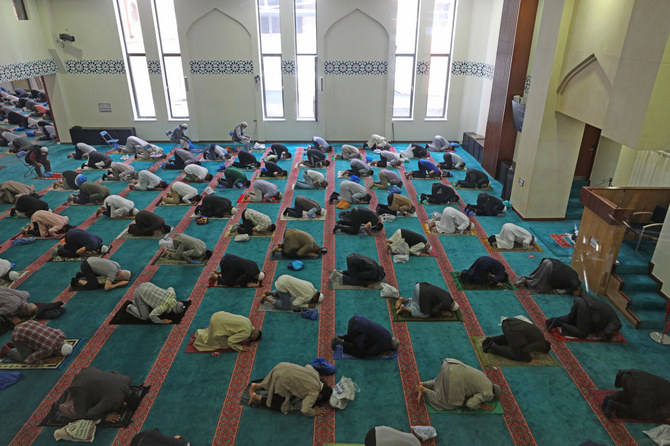
- Gloom lifted after last year’s holy month fell during strict anti-coronavirus measures
- Faithful revel in return to communal worship as restrictions eased across Britain
PM Modi votes as India’s marathon election heats up

- Modi’s ruling Bharatiya Janata Party is expected to win India’s election convincingly
- Indian PM has stepped up rhetoric on India’s main religious divide in bid to rally voters
AHMEDABAD, India: Hindu nationalist Prime Minister Narendra Modi cast his ballot Tuesday in India’s ongoing general election after giving several inflammatory campaign speeches accused of targeting minority Muslims.
Turnout so far has dropped significantly compared with the last national poll in 2019, with analysts blaming widespread expectations that Modi will easily win a third term and hotter-than-average temperatures heading into the summer.
Modi walked out of a polling booth early morning in the city of Ahmedabad while holding up a finger marked with indelible ink, flanked by security personnel and cheered by supporters.
“Voted in the 2024 Lok Sabha elections,” Modi said on social media platform X, referring to India’s lower house of parliament.
“Urging everyone to do so as well and strengthen our democracy.”
The premier’s ruling Bharatiya Janata Party (BJP) is expected to win the election convincingly, but since the vote began on April 19, Modi has stepped up his rhetoric on India’s main religious divide in a bid to rally voters.
He has used public speeches to refer to Muslims as “infiltrators” and “those who have more children,” prompting condemnation from opposition politicians, who have complained to election authorities.
Modi has also accused Congress, the main party in the disparate opposition alliance competing against him, of planning to reallocate the nation’s wealth to Muslim households.
“This is the first time in a long time that he is so direct,” said Hartosh Singh Bal, executive editor at news magazine The Caravan.
“I haven’t seen him be this directly bigoted, usually he alludes to bigotry,” he added.
“The comments on wealth redistribution are targeting something from the Congress manifesto that just does not exist and that is frankly quite unfortunate.”
Modi remains widely popular a decade after coming to power, in large part due to his government’s positioning the nation’s majority faith at the center of its politics, despite India’s officially secular constitution.
In January, the prime minister presided over the inauguration of a grand temple to the deity Ram, built on the site of a centuries-old mosque razed by Hindu zealots decades earlier.
Construction of the temple fulfilled a long-standing demand of Hindu activists and was widely celebrated across India, with extensive television coverage and street parties.
Modi’s brand of Hindu-nationalist politics has in turn made India’s 220-million-plus Muslim population increasingly anxious about their future in the country.
The election commission has not sanctioned Modi for his remarks despite its code of conduct prohibiting campaigning on “communal feelings” such as religion.
India’s election is conducted in seven phases over six weeks to ease the immense logistical burden of staging the democratic exercise in the world’s most populous country.
Much of southern Asia was hit by a heatwave last week that saw several constituencies vote in searing temperatures.
In the city of Mathura, not far from the Taj Mahal, temperatures crossed 41 degrees Celsius (106 degrees Fahrenheit) on polling day, and election commission figures showed turnout dropping nearly nine points to 52 percent from five years earlier.
An analysis of turnout data published by The Hindu newspaper concluded it was too early to determine whether hot weather was impacting voter participation.
But India’s weather bureau has forecast more heatwave spells to come in May and the election commission formed a taskforce last month to review the impact of heat and humidity before each round of voting.
High temperatures were forecast for several locations voting on Tuesday including the states of Madhya Pradesh and Bihar.
Years of scientific research have found climate change is causing heatwaves to become longer, more frequent and more intense.
More than 968 million people are eligible to vote in the Indian election, with the final round of polling on June 1 and results expected three days later.
Ground invasion of Rafah would be ‘intolerable,’ UN chief warns

- Israel has killed more than 34,700 Palestinians, around two-thirds of them children and women, according to Gaza health officials
UNITED NATIONS, United States: A ground invasion of Rafah would be “intolerable,” UN Secretary-General Antonio Guterres said Monday, calling on Israel and Hamas “to go an extra mile” to reach a ceasefire deal.
“This is an opportunity that cannot be missed, and a ground invasion in Rafah would be intolerable because of its devastating humanitarian consequences, and because of its destabilizing impact in the region,” Guterres said as he received Italian President Sergio Mattarella.
UK military personnel’s data accessed in hack, BBC reports

- MPs could be informed about the development in the Commons on Tuesday
Some personal information in a payroll system used by Britain’s defense department has been accessed in a data breach, the BBC reported on Monday.
The system was managed by an external contractor and no operational Ministry of Defense data was obtained, the broadcaster said, adding that the department took the system off-line immediately.
Information like names and bank details of current and some former members of the Royal Navy, Army and Air Force was compromised, according to the report.
The Ministry of Defense did not immediately respond to a Reuters’ request for comment outside working hours.
MPs could be informed about the development in the Commons on Tuesday, the report added.
Russia says it takes control of two more settlements in eastern Ukraine
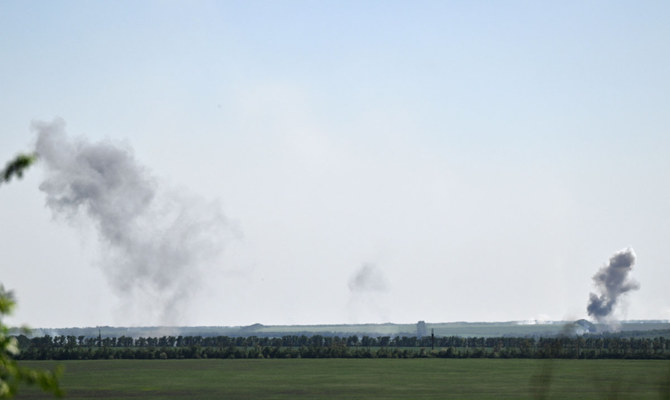
- Russia has made slow but steady advances since taking Avdiivka in February, with a string of villages in the area falling to Moscow’s forces
MOSCOW: Russian forces have taken control of the settlements of Soloviove in Ukraine’s eastern Donetsk region and Kotliarivka further north in the Kharkiv region, the defense ministry said on Monday.
Ukraine’s military made no mention of either locality in its evening General Staff report. Kharkiv Regional Governor Oleh Syniehubov said on Monday that Kotliarivka, located near the town of Kupiansk, was one of several locations to come under Russian shelling.
But Ukrainian bloggers appeared to acknowledge that both villages were in Russian hands.
DeepState, a popular forum on the war, noted on Saturday that Kotliarivka had been captured by Russian forces and on Sunday said the neighboring village of Kyslivka was also in Russian hands.
DeepState reported that Soloviove, northwest of the Russian-held town of Avdiivka, had been taken by Russian forces last week.
Russia has made slow but steady advances since taking Avdiivka in February, with a string of villages in the area falling to Moscow’s forces.
UNICEF warns 600,000 children face ‘catastrophe’ in Rafah
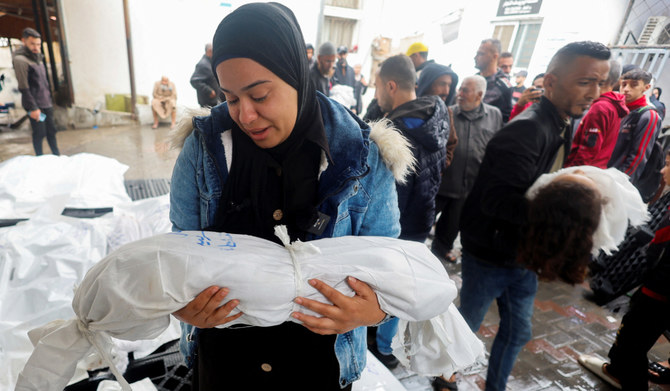
- Calling again for a ceasefire and safe access for humanitarian organizations, the agency highlighted there are some 78,000 infants under age two sheltering in the city, along with 175,000 children under five who are affected by infectious disease
- Israel has killed more than 34,000 Palestinians in Gaza, mostly women and children, according to the health ministry in the Hamas-run territory
NEW YORK: Some 600,000 children packed into Gaza’s Rafah city face “further catastrophe,” UNICEF warned on Monday, urging against their forced relocation after Israel ordered an evacuation ahead of its long-threatened ground invasion.
“Given the high concentration of children in Rafah ... UNICEF is warning of a further catastrophe for children, with military operations resulting in very high civilian casualties and the few remaining basic services and infrastructure they need to survive being totally destroyed,” the UN children’s agency said in a statement.
It said Gaza’s youth were already “on the edge of survival,” with many in Rafah — where the agency said the population has soared to 1.2 million people, half of them children — already displaced multiple times and with nowhere else to go.
“More than 200 days of war have taken an unimaginable toll on the lives of children,” said UNICEF Executive Director Catherine Russell.
“Rafah is now a city of children, who have nowhere safe to go in Gaza,” she said, warning that a large-scale military operation by Israel would bring “chaos and panic, and at a time where (children’s) physical and mental states are already weakened.”
UNICEF estimates that Rafah’s population has swelled to nearly five times its normal figure of 250,000 residents.
Calling again for a ceasefire and safe access for humanitarian organizations, the agency highlighted there are some 78,000 infants under age two sheltering in the city, along with 175,000 children under five who are affected by infectious disease.
Gaza’s bloodiest-ever war began following Hamas’s unprecedented Oct. 7 attack on Israel.
Israel has conducted a retaliatory offensive that has killed at least 34,735 people in Gaza, according to the Hamas-run
territory’s Health Ministry.
Of that toll, more than 14,000 are children, the ministry has said.
Israeli Prime Minister Benjamin Netanyahu has vowed to send ground troops into Rafah regardless of any truce, despite concerns from the US, other countries, and aid groups.
Hamas official Izzat Al-Rashiq said in a statement that any Israeli operation in Rafah would put the truce talks in jeopardy.
Senior Hamas official Sami Abu Zuhri said the evacuation order was a “dangerous escalation” that would have consequences.
“The US administration, alongside the occupation, bears responsibility for this terrorism,” the official said.
Hamas said later in a statement that any offensive in Rafah would not be a “picnic” for Israeli forces and said it was fully prepared to defend Palestinians there.
Aid agencies have warned that the evacuation order will lead to an even worse humanitarian disaster in the crowded coastal enclave of 2.3 million people reeling from seven months of war.
“Forcing 1 million displaced Palestinians from Rafah to evacuate without a safe destination is not only unlawful but would lead to catastrophic consequences,” British charity ActionAid said.
Nick Maynard, a British surgeon trying to leave Gaza on Monday, said in a voice message from the Gaza side of the Rafah crossing into Egypt: “Two huge bombs have just gone off immediately outside the crossing. There’s a lot of gunfire as well about 100 meters from us. We are very unclear whether we will get out.”
“Driving through Rafah, the tension was palpable with people evacuating as rapidly as they could.”
Witnesses said the areas in and around Rafah where Israel wants to move people are already crowded with little room for more tents.
“The biggest genocide, the biggest catastrophe, will take place in Rafah. I call on the whole Arab world to interfere for a ceasefire — let them interfere and save us from what we are in,” said Aminah Adwan, a displaced Palestinian.
Israel has been threatening to launch incursions in Rafah, which it says harbors thousands of Hamas fighters and potentially dozens of hostages.
Victory is impossible without taking Rafah, it says.



